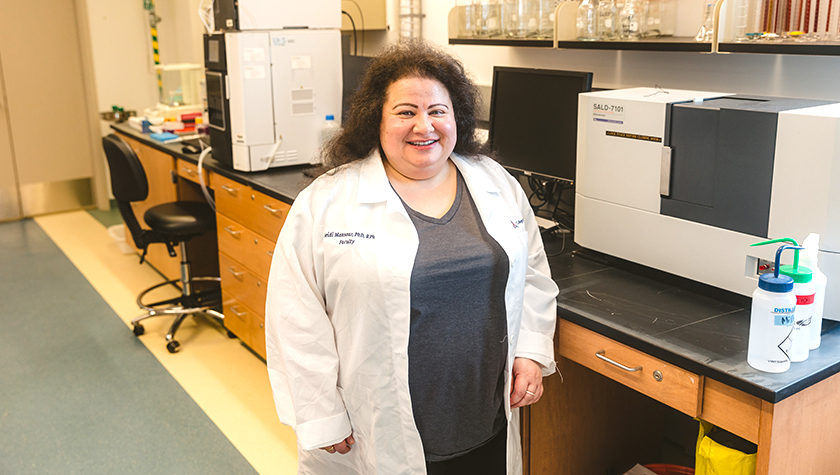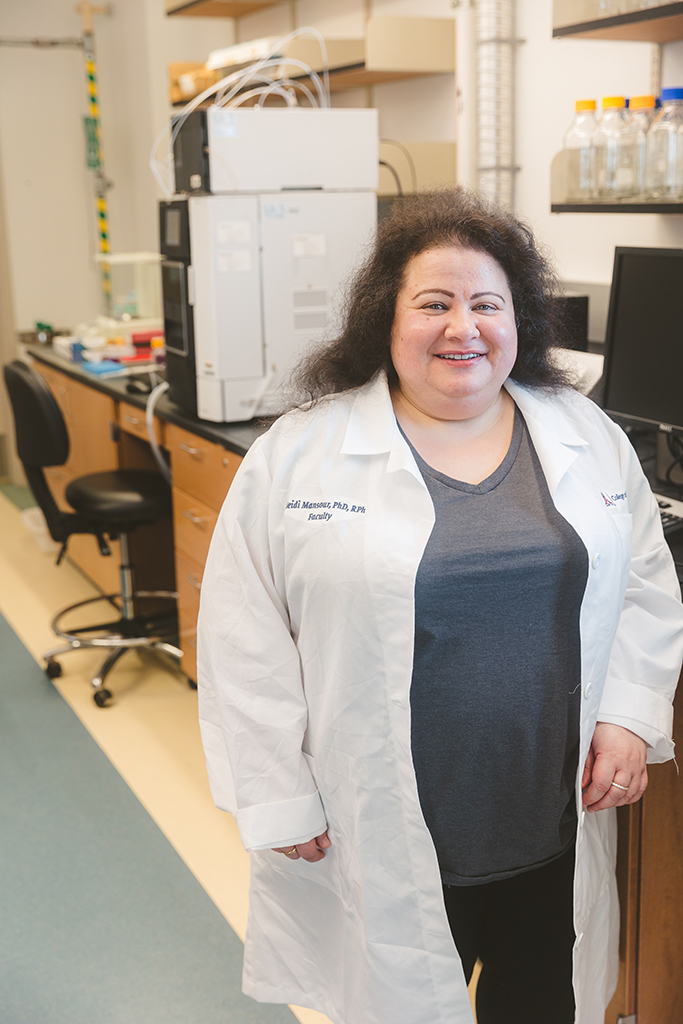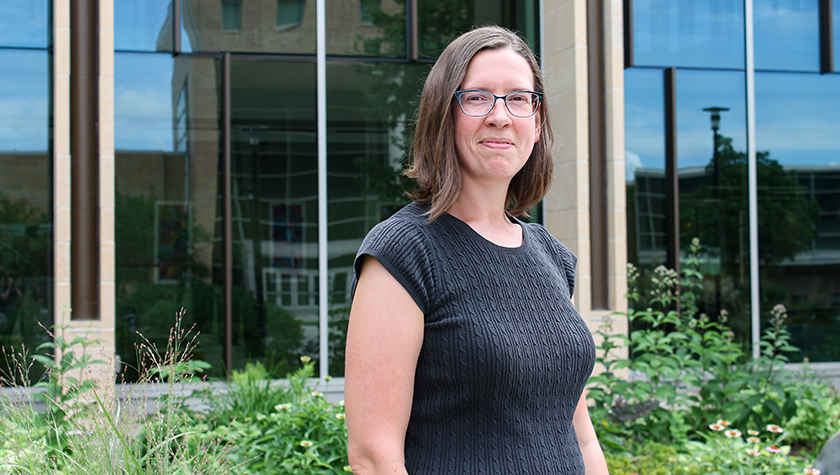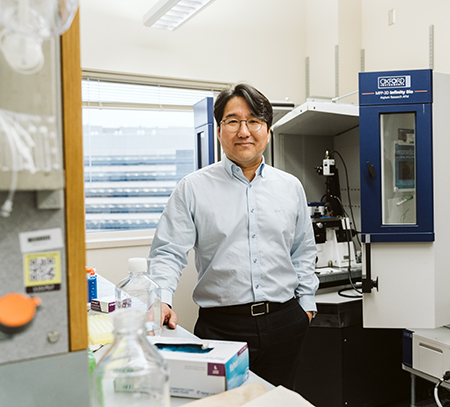
Alumna Heidi Mansour, member of the National Academy of Inventors, aims to revolutionize lung and brain drug delivery
By Nicole Sweeney Etter
Even as a toddler, Heidi Mansour (BS ’96, PhD ’03) wandered the halls of the University of Wisconsin–Madison, where her parents were graduate students in microbiology. One of her earliest memories was tagging along with her mother to class in Babcock Hall, navigating what seemed to be a field of giant legs. Years later, she found herself sitting in that same lecture hall as she worked toward her own undergraduate and doctoral degrees in the UW–Madison School of Pharmacy.
For Mansour, science and academia have always felt like home.
“I always loved being in lectures, being in lab, learning,” she said. “I love the exploration and discovery.”
Now Mansour is a professor at the Center for Translational Science at Florida International University, where she leads the Drug Discovery and Delivery Program. Last year, she was selected by her peers for the 2023 Class of Senior Members in the National Academy of Inventors — a testament to her reputation as an innovator with five issued patents, in addition to five pending patents.
“It’s a very long road, but I knew that if my team and I did the research and stuck with innovation and great science, the patents would come as fruit of our work.”
—Heidi Mansour
“I was just so humbled and delighted,” she says of the honor. “It’s such a highlight for my research group because it really speaks to all our effort over the years. The whole Academy is across disciplines, and so it’s great for networking and creating new collaborations that advance science and innovation.”
Mansour is an accomplished leader in her field: She recently became one of the founding associate editors of the Royal Society of Chemistry’s new journal RSC Pharmaceutics and recently completed her term as chair of the Basic Science Section of the American Pharmacists Association’s Academy of Pharmaceutical Research and Science, among many other professional roles. In 2022, she was inducted as a Fellow of the American Institute for Medical and Biological Engineering — an honor bestowed to the top 2 percent of medical and biological engineers.
“I always wanted to do research that would have an impact on human health,” she says. “It’s a very long road, but I knew that if my team and I did the research and stuck with innovation and great science, the patents would come as fruit of our work.”
Innovating solutions for drug delivery
Mansour’s patents include advanced dry powder inhalers for pulmonary conditions, neurosteroid formulations, topical formulations for drug delivery in skin cancer, and hydrogel formulations for wound healing and prevention. She is best known for her work in nanomedicine and advanced approaches to effective drug delivery to the lungs and brain.
She first got interested in lung disease as a doctoral student working under the direction of Professor Emeritus and former School of Pharmacy Dean George Zografi. She began by exploring new ways to treat respiratory distress syndrome in premature babies, and she credits some of her early interest to her own experiences with lung infections as a child.

“Lung disease is a fascinating area for therapeutics,” Mansour says. “And then I continued that throughout my career for various other diseases. Some of the synthetic lung surfactants that I was developing have led to products and patents, and we’re using them not just as a therapeutic, but also as nanocarriers of drugs.”
Since leaving Wisconsin, her career has taken her to the University of North Carolina at Chapel Hill and the University of Arizona before she settled in Florida in 2022. While her lab continues to study airway and vascular lung diseases, she has expanded into other areas, from neuroscience to infectious diseases to cancer.
With funding from the National Institutes of Health (NIH), Mansour’s team has developed patented skin drug delivery formulation platforms, some of which are entering the clinical trial phase. For that project, she is working with colleagues at the University of Arizona on novel strategies to prevent non-melanoma skin cancer by treating lesions that could potentially become cancerous.
For another NIH-funded project, Mansour is working with partners at the University of Arizona to test drug delivery to the brain and central nervous system — specifically, a first-in-class synthetic peptide therapeutic to treat cognitive impairment in patients and a first-in-class neurosteroid therapeutic for people who are at risk of Alzheimer’s disease and other dementias. The team’s approach targets the Mas receptor in the brain to reduce inflammation and increase cerebral circulation. That therapy is also entering the clinical trial phase.
But the journey to the marketplace is long, she notes.
“It does take time, and that’s one of the key things to remember as a scientist — to have that patience, diligence and passion to keep going and moving forward and not get discouraged because it is so long and not necessarily smooth. It’s not for those who like to sprint unless you think of a sprint as over years.”
She is also always looking toward the next research horizon.
“There is still a lot to be done in research and advancements to be made in neuroscience, oncology, infectious diseases, airway and vascular lung diseases,” she says. “These are vibrant research areas, and we’ve been fortunate in making a positive impact by recognizing where the unmet needs are and helping fill those gaps as well as help shape those areas moving forward.”
Leaving a legacy of leaders
While her research is gratifying, she especially relishes her role as a mentor — both to her graduate students and postdoctoral researchers as well as high school students.
“A lot of the high school students I work with are women and under-represented minorities, and it’s wonderful to get them exposure to STEM research early so they can have more opportunities,” she says.
“What I’m proud of professionally is seeing the next generation that have come through my lab and helping them reach that next stepping stone.”
—Heidi Mansour
On the graduate level, about half of Mansour’s trainees have gone into careers in academia and the other half are working in the pharmaceutical industry.
“What I’m proud of professionally is seeing the next generation that have come through my lab and helping them reach that next stepping stone,” she says. “It’s very rewarding.”
It’s also a way to pay forward the world-class education she received at UW-Madison, which helped shape the scientist she is today, she notes.
“That type of environment was very stimulating mentally and also very exciting,” she says. “I learned that if you’re willing to work hard, there are many opportunities that come your way, and the harder you work, the more successful you become.”

